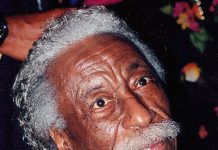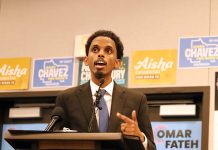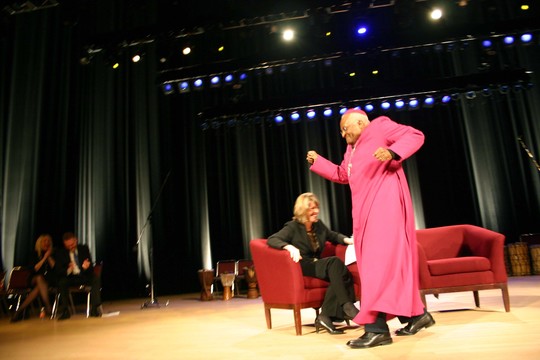

St. Paul Mayor Melvin Carter III asked the city’s voters to give him a third term when they go to the polls in November so that he could complete what he said was the great work he had started.
The mayor highlighted decreased homicide rates in recent years, infrastructure expansion, and housing development projects that began during his tenure as a mark of progress for the city.
“I’m very proud of the progress we made through some of the most challenging times in our city’s history,” Carter said. “We know that homicides are down on pace for a ten-year low in our city, we know that we’ve doubled our pace to rebuild our city’s streets and critical infrastructure, and we know that we have over a billion dollars in development projects underway in our community.”
Carter was speaking at a forum the League of Women Voters held on Wednesday at Johnson High School to give voters a chance to hear from the candidates running for election to lead the state capital. The four candidates seeking to unseat Carter include Adam Dullinger, Yan Chen, Mike Hilborn, and Kaohly Her, a state lawmaker who currently represents District 64A in the Minnesota House of Representatives and was the policy director for Mayor Carter during his first term in office.
The candidates discussed various topics, including the city’s business environment, infrastructure, public safety and gun violence, affordable housing, and immigration.
One of the first questions asked during the session was how the city could raise revenue after the recent permanent closure of major businesses like Cub Foods. Blaming theft, crime, drug use, and homelessness, the grocery chain permanently closed one of its branches in St. Paul in early August, leaving behind a large vacant space in the city’s Midway neighborhood. Cub Foods closure came a few months after another Minnesota grocer, Lunds and Byerly’s, closed its store in downtown Saint Paul, citing similar issues. The departure of both grocers left neighborhoods at risk of becoming food deserts, a term used to describe places where residents have no access to fresh produce.
Her, the state representative, alleged that the closure of the grocers was due to government failure to act to reduce crime.

“When the Cub closed I [dug] a little bit into why they closed,” Her said. “I learned that when Cub was struggling, they reached out to City Hall and City Hall was not responsive. You cannot solve problems if you’re not answering your phone and you are not meeting with people.”
Carter disputed her comments.
“With all due respect, that is fundamentally untrue,” he said. “We met with the Cub leadership and had a great conversation with them and built a plan.”
The mayor claimed that it was Cub leadership not contacting law enforcement in the face of crime. He said that it was not possible for law enforcement to respond unless they had been notified. Carter also said that it was the grocer that stopped communicating with the mayor’s office.
“In the end when they were closing other stores,” Carter said. “It was actually Cub that stopped responding to us. It was the other way around.”
Safety has been a major concern in cities across the United States. Candidates were asked how they defined safety.
Hilborn, a businessman, said that law enforcement plays a crucial role in public safety. He emphasized on accountability, so that people understand that if they break the law something “uncomfortable and bad” will happen.
“We have to have it, so people feel safe coming down to Saint Paul,” he said. “We have to hold people accountable, when somebody breaks a window, they don’t get to get back out the next day if they’re going do it all over again.”
Panelists largely agreed that there was a need for more affordable housing to combat homelessness. They also stated that rent control, which is in effect in St. Paul but not in Minneapolis, might be hurting individual landlords and not contributing to lowering the cost of housing.
Immigration has been a topic of great interest nationally. Since the re-election of President Donald J. Trump, United States Immigration and Customs Enforcement (ICE) agents have been making record number of raids across the country.
Most of the mayoral candidates agreed that local law enforcement agents should not collaborate with ICE.
“The city of Saint Paul will never criminalize someone’s identity or where they’re from or what their nationality is,” Carter said.
Hilborn was the only candidate who disagreed. Hilborn, who previously ran for office as a Republican for a seat in the Minnesota House of Representatives for district 65B, said that collaboration with ICE was necessary to combat violent crimes.
“I’m going to disagree with you guys,” he said. “Let’s get rid of the people that are causing the damage, the theft, the murder, and let’s just not have collateral damage when we’re only trying to catch these guys.”
Both Chen and Her are immigrants who moved to the United States from China and Laos, respectively.
“My community is being targeted,” Her said. “I came here as a refugee, and my community is getting ripped apart. Our city needs to do better with our police force… we have to deploy our police to say we will protect our citizens when this happens.”
Early voting in Ramsey Country is underway, and the ranked-choice election will take place on November 4. The new mayoral term will begin in January 2026.
About Cynthia Simba, Mshale Reporter
Cynthia is a graduate of the University of Minnesota School of Journalism. She has interned at Mshale and Voice of America and previously worked at the Minnesota Daily. She recently returned from Seoul, South Korea where she was an English educator.










